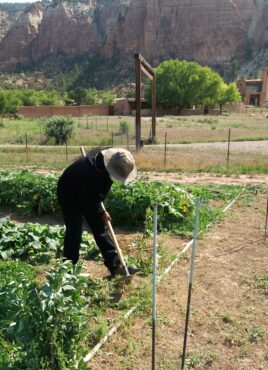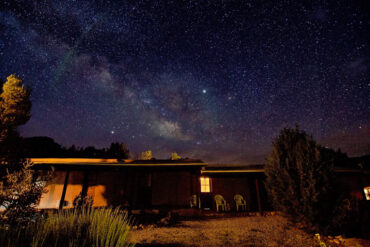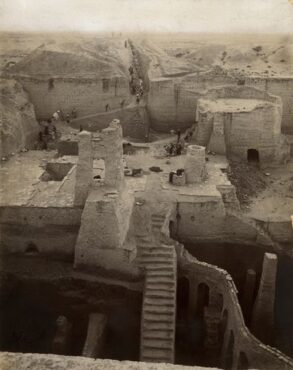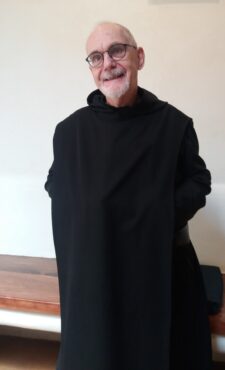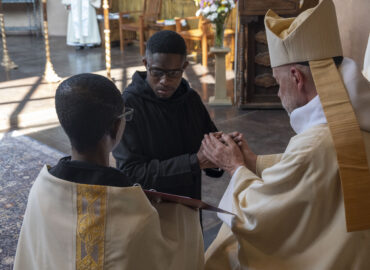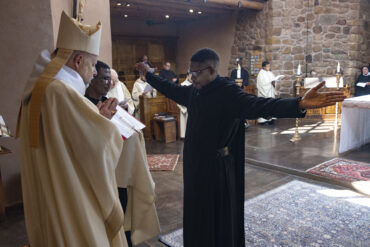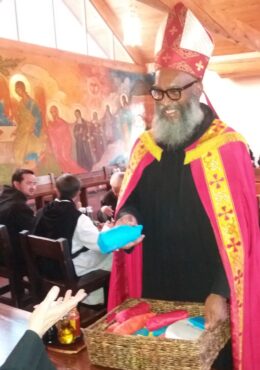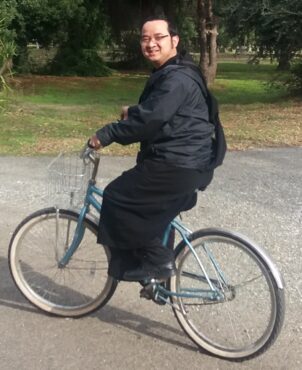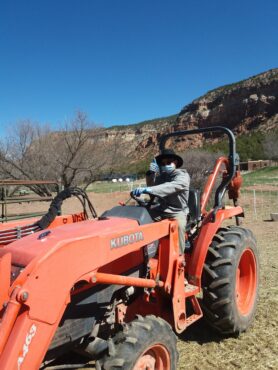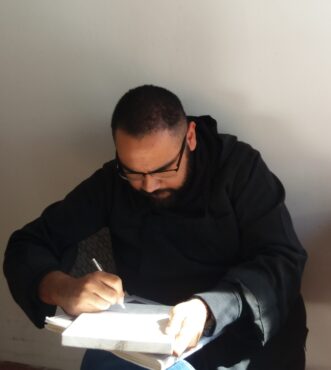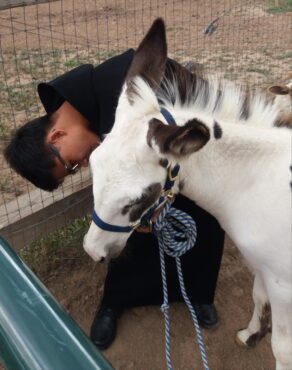Obedience
Everyone on earth is expected, to one degree or another, to be obedient. When you think about it, many people have to be attentive to the seasons, as to when to plant and when to harvest. That is a form of obedience. Countless people in various walks of life have to be obedient to traffic signals, for instance, as well as to the law of the land in general, and to the needs of spouses, children and loved ones. In a very real sense, there is no escaping the reality of obedience!
Our English word, “obedience,” is related to the Latin word, “obsculta,” literally meaning: Listen! Saint Benedict’s “Rule for Monasteries,” written about the year 500, and still followed by tens of thousands of Benedictine monks and nuns around the world, opens with the word, “Obsculta,” “listen.” This word expresses
so well the tone Saint Benedict wishes to set forth to those who read and follow his Rule. Sometimes people refer to the Rule of Saint Benedict as “the Rules (plural) of Saint Benedict,” but that is an error. The singular form of the word, “Rule,” implies a “way,” a “regula,” that is, a measured manner of life, intended to be all-encompassing and touching on every aspect of one’s existence.
For followers of Christ, the principal “rule” of living, of course, is the Gospel, which Jesus proclaimed and which was codified by the various authors of the Scripture texts. Really, though, all that is contained in what we call “the Bible” is to be our “rule of life.” It should also be said that Saint Benedict, living a few centuries after Christ, does not address his Rule to an elitist class or “super-Christians,” but to ordinary men and women, who wish to follow with greater intensity the Gospel message of the Lord.
Saint Benedict’s use of the word, “listen” at the beginning of his Rule indicates the full significance of listening, what the late Benedictine scholar, Father Terrence Kardong, calls “complete attention of the whole person; good will; implementation.” For Benedictine monks, listening is to take precedence over merely
seeing and hearing. The point is to put into practice what God is asking, and calls to mind the central prayer of the Jewish Scriptures: “Hear, O Israel: the Lord is our God, the Lord alone” (Book of Deuteronomy, chapter 6, verse 4).
What all of this is saying to me as abbot of this Monastery, and what I wish to convey to you, is that monks are not “supermen,” but ordinary men, who desire to follow in the footsteps of the Master, Jesus Christ. We do it in a particular way, within the monastery, but all people, the majority of humanity, have
not embraced the monastic way, but nonetheless need to be “listeners,” with “the ear of the heart,” as Saint Benedict expresses it, so as to be ready to obey and offer one’s life in service of one another and all of humanity.
Just as the monks learn to listen and obey, for example, through Sacred Scripture, through their abbot, through the sick brothers and through the guests, all of us might ask: how can I be a better “listener,” and how might I more readily obey all those who enter my life?
The theme of our Advent/Christmas Newsletter this year is “Obedience.” I hope your reading of the following essays will indicate that obedience is not to be thought of as drudgery or oppression, but as something life-giving and even lovely, because it is done out of love, for God and neighbor.
Blessed Advent and Christmas 2021!
 ✠
✠
Veritas Orchard:
The Ecological Dimension of Obedience
By Father Columba
As we prepare the ground – some very hard baked clay ground – for the planting of 12 fruit trees this fall – apples and pears – an expert orchardist who has been growing fruit of all kinds in the high desert of northern New Mexico for 30 years advises us. We do what he suggests to the best of our ability because we can see what his experience and knowledge and gifts has done, the fruit of his labors in his orchards, which are spectacular and a wonder to behold.
One of his most insistent instructions has concerned the preparation of soil, with diligence, to plant an array of certain plants that will help transform our hard and clay soils by bringing up the minerals and nutrients the young fruit trees will need to flourish and bear fruit here at Christ in the Desert. Such plants will also attract beneficial insects, and microbial life that will in turn nurture and sustain the growth of our orchard. Of course, we will need to irrigate as well, and be sure to plant with the right spacing, and in our context, because of the compact hardness of the ground, to make the holes for planting three times the size of the root ball of the trees.
I obey my master orchardist, who has learned to obey the ecology of the orchard, the laws as it were of soil health, microbial conditioning, water supply, beneficial insects, and so on, so that in turn I might help to create a healthy and fruitful orchard for the community and our guests to enjoy one day. In this connection who can argue with the wisdom, the virtue, of obedience?
Obedience is a foundation of all life. Benedictine monastic life commits the monk to relationships in some sense defined by obedience: obeying his Abbot and also his brothers in community especially. We must work to be open to the other, receptive to the word of the other, their needs, their actions, their gifts and faults, and this openness is transcendent: it runs from God right through his creation and I, if I am to be fruitful in this life, as in the next, cannot just make things up on my own. I have to learn how to be obedient. Obedience is all about fostering the relationships that define our life. One might say that there is an ecological dimension of obedience, a web of life, a communion of relations which obedience helps to generate, nurture, and make fruitful. It is thus a life-giving, transforming power. Does obedience to God help us in our relations with other creatures?
In this connection, C.S. Lewis writes of the particular quality of human obedience that: “As an organism, man is subjected to various biological laws which he cannot disobey any more than an animal can. That is, he cannot disobey the laws which he shares with other things. But the law which is particular to his human nature, the law he does not share with animals or vegetables or inorganic things, is the one he can disobey if he chooses.”
✠
HOMILY GIVEN ON THE FEAST OF SAINT MATTHEW
By Father Caedmon
You may know that Pope Francis has as his personal motto on his coat of arms words from today’s second reading at Vigils: miserando atque eligendo. These are from a homily of St. Bede on todays’ Gospel. Bede says that Our Lord saw Matthew the tax collector sitting at the tax office, and because he saw him with pity and with choosing, he said to him, Follow me. Miserando atque eligendo means “pitying and choosing.”
In an interview with Pope Francis published six months after his election, the interviewer’s first question to the new Pope was; “Who is Jorge Mario Bergoglio?” The Pope took the question very seriously and answered, “I do not know what is the most fitting description…I am a sinner… This is the most accurate definition. It is not a figure of speech … I am a sinner…” Then the interviewer says “The Pope continued to reflect and concentrate as if he had not expected this question, as if he were forced to reflect further. “Yes, perhaps I can say that I am a bit astute, that I can adapt to circumstances, but it is also true that I am a bit naive.
“Yes, but the best summary, the one that comes more from the inside and I feel most true is this: I am a sinner whom the Lord has looked upon.” And he repeated: “I am one who is looked upon by the Lord. I always felt my motto, Miserando atque eligendo, was very true for me.” And he went on, “I like to translate it with another word that does not exist: misericordiando” (rather than miserando): ‘mercying’. Those are Pope Francis’ words, derived from Bede’s homily on the story we have just heard, of the call of Matthew from the tax office to become an apostle. As we saw vividly in the film series ‘The Chosen’, Matthew was a public sinner, cooperating in the Roman oppression of his own people, and by doing so making himself hated and despised by his people while accumulating wealth and privileges for himself.
That our Lord is full of mercy for us is made explicit at the end of this Gospel, where Jesus answers the complaint of the Pharisees, the good people, to his socializing with tax collectors and other sinners by saying “I did not come to call the righteous (that is, the good people) but sinners.” What good news that is for us! Which, of course, does not mean that we can let ourselves go in a life of sin, confident that God’s mercy cancels out all our wrong. St Luke, in his telling of this same story, quotes the last words as “I came to call not the righteous but sinners to repentance.” To metanoia. To a change of thinking, of attitude. That is surely the meaning of our Lord’s words. And it in no way diminishes the mercy he is extending to us. The Gospel is aimed primarily at us who are sinners. But his mercy would really be no mercy at all if it left us just as it found us. St Bede’s homily closes with these words: “We open the door at the sound of his voice to receive him, when we freely assent to his promptings, and when we do what we know we should do. He enters, then, so as to eat with us and we with him, since he lives in the hearts of those he has chosen by the gift of his love. He rejoices their hearts by the light of his presence to the extent that they make more and more progress in their longing for heaven, and it is as though he himself delighted in the banquet of eagerness for heaven which they spread for him.”
Because we cannot have heaven, which is God, unless we really want him and him alone. “I am the Lord your God who brought you out of the land of Egypt, out of the house of slavery; you shall have no other Gods before me”.
✠
A MESSAGE FROM THE GUESTMASTER
Brother Chrysostom
Happily, we announce the reopening of our Guesthouse after nearly two years! We thank you all for your patience and support during this pandemic and the time the Guesthouse has been closed. The Rule of St Benedict exhorts us to go beyond the social graces, the superficial smile or the warm reception of expected guests. Hospitality for Benedict meant that everyone who comes — the poor, the traveler, the curious, those not of our religion or social standing or education — should be received with genuine acceptance. In short, our guests are to be received as Christ. In obedience the Abbot, I, and the brothers adhere to this aspect of the Rule with conviction. Our Guesthouse represents our charism of hospitality, and it is the source of so many fond memories for many of our guests. We ask that those of you who wish to reserve a room at our Guesthouse do so through our online reservation system at christdesert.org There will be a reservation opening notice communicated through our website to let you know when the system is open to take your reservation. We look forward to welcoming you back; you have been sorely missed. God bless.
✠
CLOISTER HUMOR
Not long ago, a brother was bringing an elderly wheelchair-bound monk into his place in church. Trying to make haste, so as to get in choir before the Divine Office began, the Brother pushed the wheelchair at a good clip. When they reached the elder’s place in church, the old monk turned to his helper and said, “You drive too fast.”
When reading the verse of Psalm 103 “In festive gatherings, bless the Lord,” an overly zealous (or perhaps pessimistic) monk read instead, “Infested gatherings, bless the Lord.”
✠
THE FIFTH GOSPEL
By Father Zachary 
A fifth gospel? Our Bibles contain only four, Matthew, Mark, Luke and John. What do we mean by a fifth?
St. Paul VI used this phrase to describe Palestine, the Holy Land. Like the four written Gospels, the land where much of the history of salvation was played out, the land where Jesus was born, the place where he grew up and, later, the places in which he exercised his ministry of teaching and healing and, perhaps most importantly, the site of his crucifixion and resurrection, all of these speak to us of the Lord, of the Father and his love for all of us, of the new life he offers. Speaks to us, that is, if we have the ears to hear this voice, the voice of ancient stones and rubble, of long buried archaeological sites, of places long since abandoned. From the beginnings of the Christian Church, the places associated with the Lord and his ministry have been important to Christians. Over the centuries many are the pilgrims who have found light and inspiration by walking physically in Jesus’ footsteps, by visiting the places in which he lived and worked.
The symposium, a very full three days of lectures on work currently being done at a variety of digs in the Levant, as well as more general presentations on the discipline of Biblical Archaeology itself, was organized by Veritas International University and Trinity Southwestern University—both schools associated
with Evangelical Protestantism—and was attended by some 150 people. There we were able to listen to scholars, most of them actively working at archaeological sites in Palestine, from all over the world.
It is not possible here to go into all the details of these presentations we were able to listen to fascinating mosaics being uncovered at a Byzantine era synagogue in Huqoq in north-eastern Galilee; excavations at what might well have been the site of Sodom, not under the southern bed of the Dead Sea,
but to the North, a site violently destroyed in the 18th century before Christ; the identification of the Pharaoh at the time of the Exodus, and so many others—but these can be studied in articles and publications. Underlying all of them, though, was rigorous scholarship and serious faith, a faith bolstered and
perhaps even enlightened by the evidence given in the “the fifth Gospel.” Being able to share in these presentations, even though only for a few days, was a great joy for the three of us who were able to attend, and, I hope, through us for all the brothers at Christ in the Desert.
One last note, an added benefit of our stay in Albuquerque. While there we were given hospitality, in true Franciscan style, by the friars of the Provincial House of Our Lady of Guadalupe Province, the Southwest Province of the Franciscans. The Guardian Fray Erasmo and the friars welcomed us as brothers, showed themselves truly interested in what we were learning and welcomed us into their life of prayer.
✠
MONK’ S CORNER
Brother Andre Lemieux
What is your name and age?
Andre Lemieux, I am 73 years old. I am from Bristol, CT
How long have you been a monk at MCD?
I arrived at the monastery in 1982 and made vows in 1984. Throughout my monastic life I have held many jobs and assumed many different responsibilities. I served as Prior, Vocation Director, Junior Master, Novice Master. People remember me mostly as the Guestmaster, a position I held for most of my monastic life. I also have been a weaver (mostly place mats) and now I do crafts for our Giftshop.
What were some of your challenges as a monk at MCD during your time here?
The hardest thing about community life IS community life. You are always learning how to live side by side with different people. I have come to realize that different people have different senses of “common sense”.
What changes have you witnessed during your time here at MCD?
I have seen different people come and go over the years. I was here when there was no electricity, poor heating, kerosene lamps were in use. Over the years I have seen things improve in those areas! When I was Guestmaster, my cell was also my office (which is now a part of the monastery
library). I have also seen the transition from American vocations to international ones.
Who is your favorite saint, and why?
André Bessette, C.S.C. (9 August 1845 – 6 January 1937), more commonly known as Brother André (French: Frère André), and since his canonization, as Saint André of Montreal, was a lay brother of the Congregation of Holy Cross. Like me he was short and had a good sense of humor. He
is credited with thousands of reported miraculous oil healings associated with his pious devotion to Saint Joseph. I also have a soft spot for Thérèse of Lisieux.
✠
BROTHER ISIDORE’S SOLEMN PROFESSION
On the Feast of the Transfiguration of the Lord, August 6, 2021, at the Benedictine Abbey of Christ in the Desert, the Solemn Monastic Profession and Consecration of Dom Isidore Marcel Ilunga Mukendi, O.S.B. was celebrated. Despite the heightened concern about COVID-19, many friends were able to attend the profession and enjoy the delicious meal prepared by monks at the reception afterwards. Musicians from Chama and monks played for guests. May God continue to bless Br Isidore in his monastic vocation.
✠
SAINT NICHOLAS
By Brother Chrysostom
This Christmas Newsletter was compiled with the theme of obedience in mind. The word obedience comes from the Latin root “to listen”. To ask someone to obey us is to ask them to listen to us. St Benedict begins his Rule with the Latin word “ausculta” translated into English it means “hearken” or “listen.” Christmas is a perfect time to listen to the sounds that are created. The laughter, the singing, the bells, the stories and traditions, and most importantly the Scripture passages that bring us closer to the mystery of God becoming man by being born of a Virgin. Listening, different from just hearing, means that we block out or invest little energy in the booming sounds of commercialism, materialism, secularism, and societal disconnect. Not an easy task, but it is a purposeful way of entering into the beauty of the mystery of the birth of the Savior of the World. St. Nicholas visits our monastery each year in December. He brings presents to the monks, small but individualized, trinkets and small treasures, that brighten the season for us. That gives us the sense of receiving a gift, unmerited, yet greatly appreciated and cherished. St. Nicholas, also known as “Nikolaos of Myra,” was a fourth century saint and Greek bishop of Myra. According to church tradition, he was born into wealth and gave his inheritance to the poor. As an only child, he was exceedingly well brought up by his parents and trod piously in their footsteps. The child, watched over by the church, enlightened his mind and received encouragement for his thirst for sincere and true religion. St Nicholas, closely associated with tradition of Santa Claus (say, St Nicholas repeatedly in rapid succession and you may understand the connection), was not just a doer of good works, but he listened to what God had called him to do with his talent, time, and treasure. Yes, there is a real St. Nicholas. But he is not what Christmas is all about. It is about the birth of Jesus Christ, the gift to mankind surpassing explanation or merit. This Christmas, let us be obedient and listen to what the Christ child says to our hearts. God bless.



